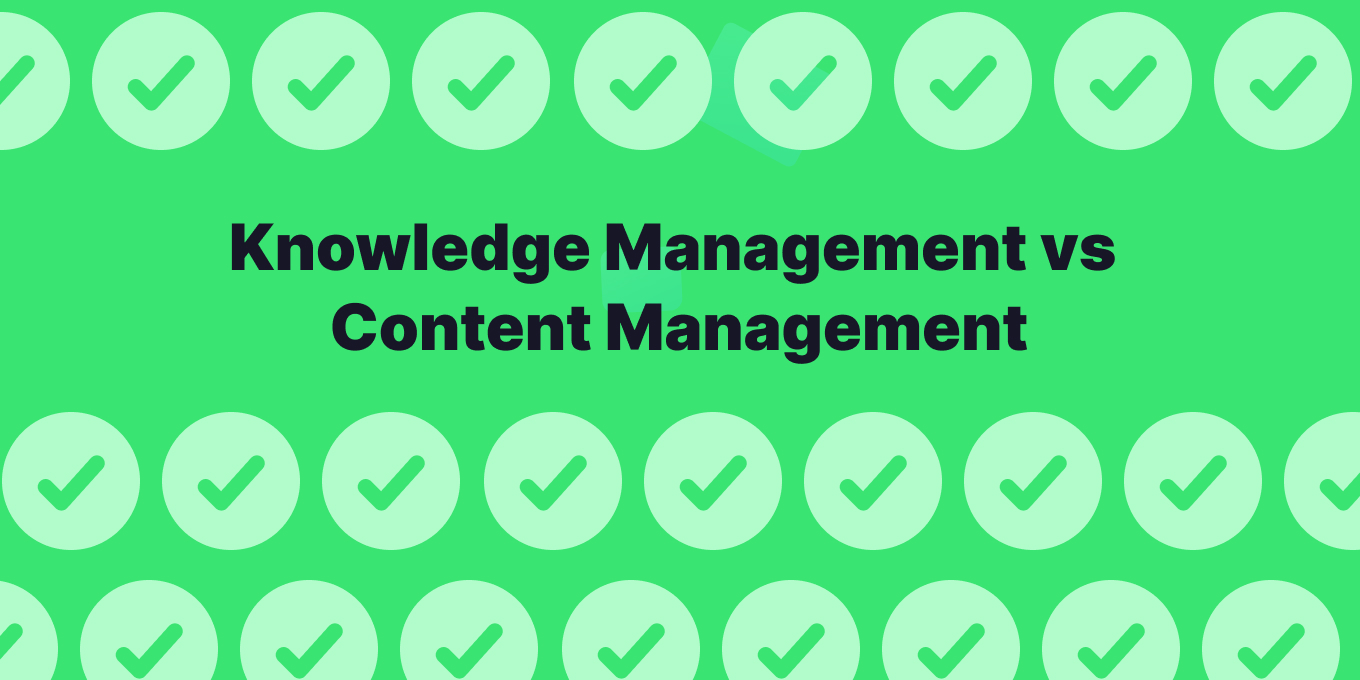What is Knowledge Management?
Effectively organizing and utilizing knowledge management is paramount. Enter Knowledge Management (KM). Knowledge management revolves around capturing, organizing, and leveraging both tacit and explicit knowledge within an organization to benefit its operations and strategic objectives.
What is Content Management?
At its core, content management is the process of handling digital content throughout its lifecycle. This involves stages such as content creation, editing, publishing, employing version control, and, when necessary, removal.
Content governance, a pivotal part of this process, ensures a consistent user experience by establishing and enforcing rules, workflows, and guidelines. A well-implemented content management system not only simplifies these stages but also upholds the consistency and relevance of the content being delivered.
Understanding the Difference Between Knowledge Management & Content Management
Knowledge management and content management may seem intertwined, but they serve distinct purposes and offer unique functionalities.
While KM focuses on capturing both the explicit knowledge (documents, databases) and the tacit knowledge (experiences, insights) of an organization, content management is primarily concerned with the creation, storage, and distribution of digital content.
Key Differentiators Between Knowledge Management & Content Management
1. Document Retention and Version Control
Both knowledge and content management systems prioritize document retention and version control. Effective management of these elements ensures accuracy, consistency, and compliance in a rapidly evolving digital landscape. Neglecting this can lead to misinformation, non-compliance with regulations, and even loss of crucial data.
2. Data Accessibility and Security
Knowledge management systems often house intellectual property, making data accessibility and robust security features vital. By documenting such knowledge, organizations ensure its longevity for current and future employees. This is contrasted with content management systems that, while also requiring security, might not always house as sensitive or proprietary data.
3. Relevance of Content
Relevance is key in both systems. Content management is about delivering pertinent content to users based on predefined criteria, while knowledge management ensures that organizational knowledge is relevant and can be applied to various situations.
By optimizing content delivery and tailoring user experiences, both systems cater to their respective audiences effectively.
4. Analytics and Insights
Knowledge and content management systems come equipped with tools for analytics and insights. These functionalities provide critical data and metrics, guiding organizations in making informed decisions to enhance user experiences or internal processes.
5. Scalability of Solutions
As organizations grow, so does their data. Both KM and content management systems are designed with scalability in mind, ensuring that an increasing amount of data and users are managed without compromising performance. They can also be expanded and adapted to cater to evolving business needs.
6. Support for Collaboration
Collaboration is an integral part of knowledge management systems, which offer tools like collaborative authoring and discussion forums.
Content management systems might offer limited collaboration features, but the collaborative potential in KM systems leads to enhanced teamwork, idea generation, and strategic thinking.
Benefits of Knowledge Management & Content Management Systems
The adoption of KM and content management systems can lead to numerous organizational advantages.
1. Strengthened Customer Experience & Satisfaction
By reducing the search time for customer support agents, knowledge management systems allow for quicker and more precise solutions to customer queries. Content management systems empower customers by granting them access to relevant documentation, enabling them to independently resolve their concerns.
2. Improved Employee Productivity & Efficiency
With easy access to pertinent information and knowledge, employees can find solutions swiftly, make informed decisions, and enhance their overall productivity. The collaborative features of these systems further allow for knowledge sharing and teamwork.
3. Enhanced Potential for New Customers
By offering relevant documentation and improving customer satisfaction, these systems increase customer loyalty and open the door for prospective customers. The content in these systems directly caters to the end-users, who often are, or become, loyal customers.
4. Challenges Facing Knowledge Management & Content Management Systems
Despite their benefits, KM and content management systems face challenges. Retaining and effectively leveraging valuable organizational knowledge can be complex.
Additionally, managing varied types of data, like structured and unstructured information, can be daunting. Addressing these challenges head-on is crucial for the successful implementation and maintenance of these systems.
Get more tips about knowledge management from Tettra:
- What is knowledge management? The basics explained
- 8 examples of knowledge management systems
- 5 steps of the knowledge management process
- Here’s your knowledge management strategy
- 11 best knowledge management tools to use right now
Use Tettra for Your Knowledge Management
Using Tettra for knowledge management offers a seamless way to streamline company knowledge and foster team collaboration.
As a single source of truth, Tettra simplifies the documentation process, ensuring that team members can quickly find and access the information they need. Its user-friendly interface, combined with powerful integration capabilities, means that your company’s knowledge base is not just a repository but an active tool that evolves with your team’s needs, enhancing productivity and ensuring everyone stays on the same page.
Tettra offers a full suite of tools for sharing knowledge. With Tettra, you’ll get:
- AI-powered knowledge base software to document answers
- Q&A workflow to capture questions
- Knowledge management features to keep content up to date.
- Integrations with Slack, MS Teams, Google Docs, Github and Zapier to help your team answer and capture knowledge quickly

